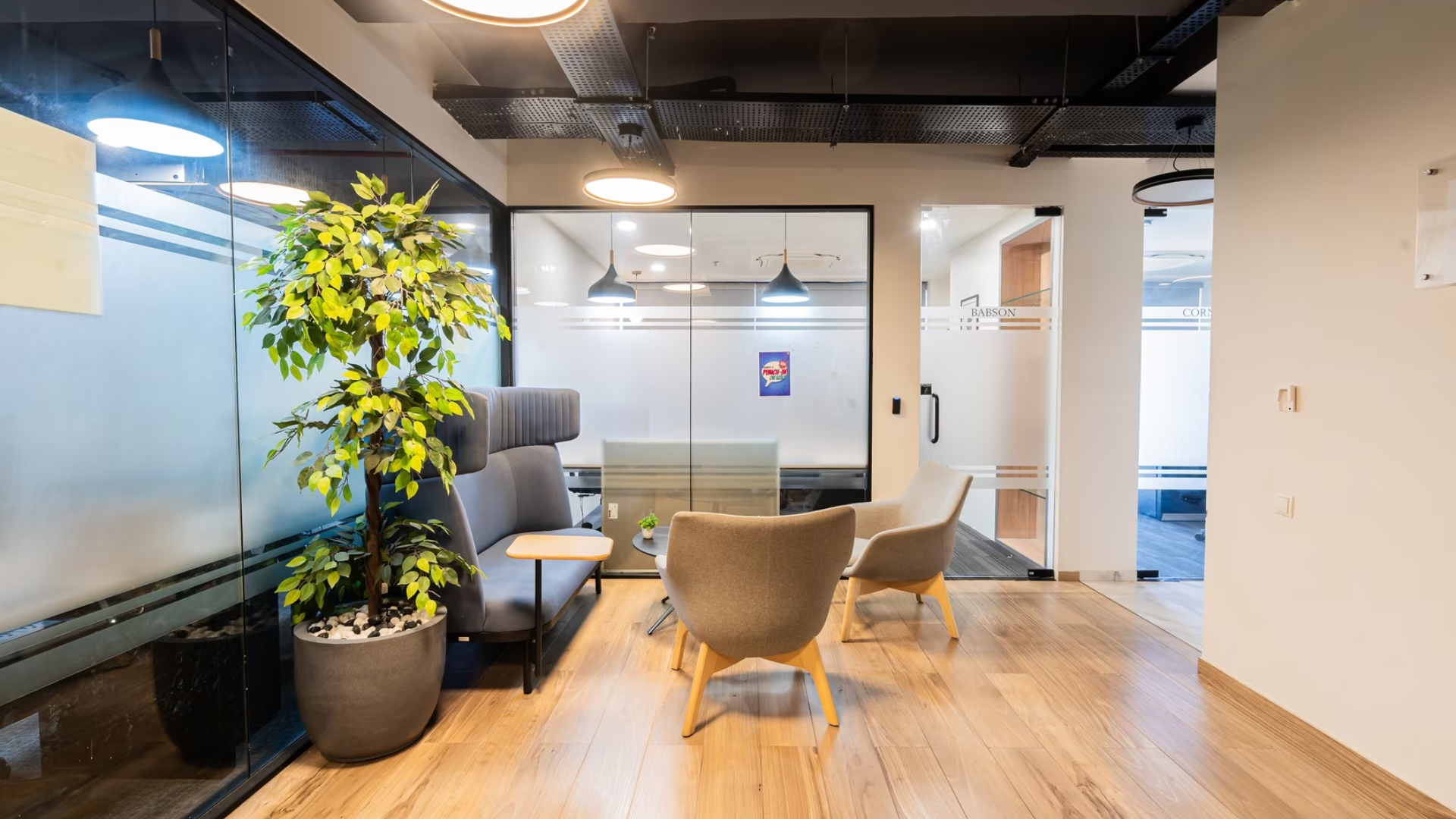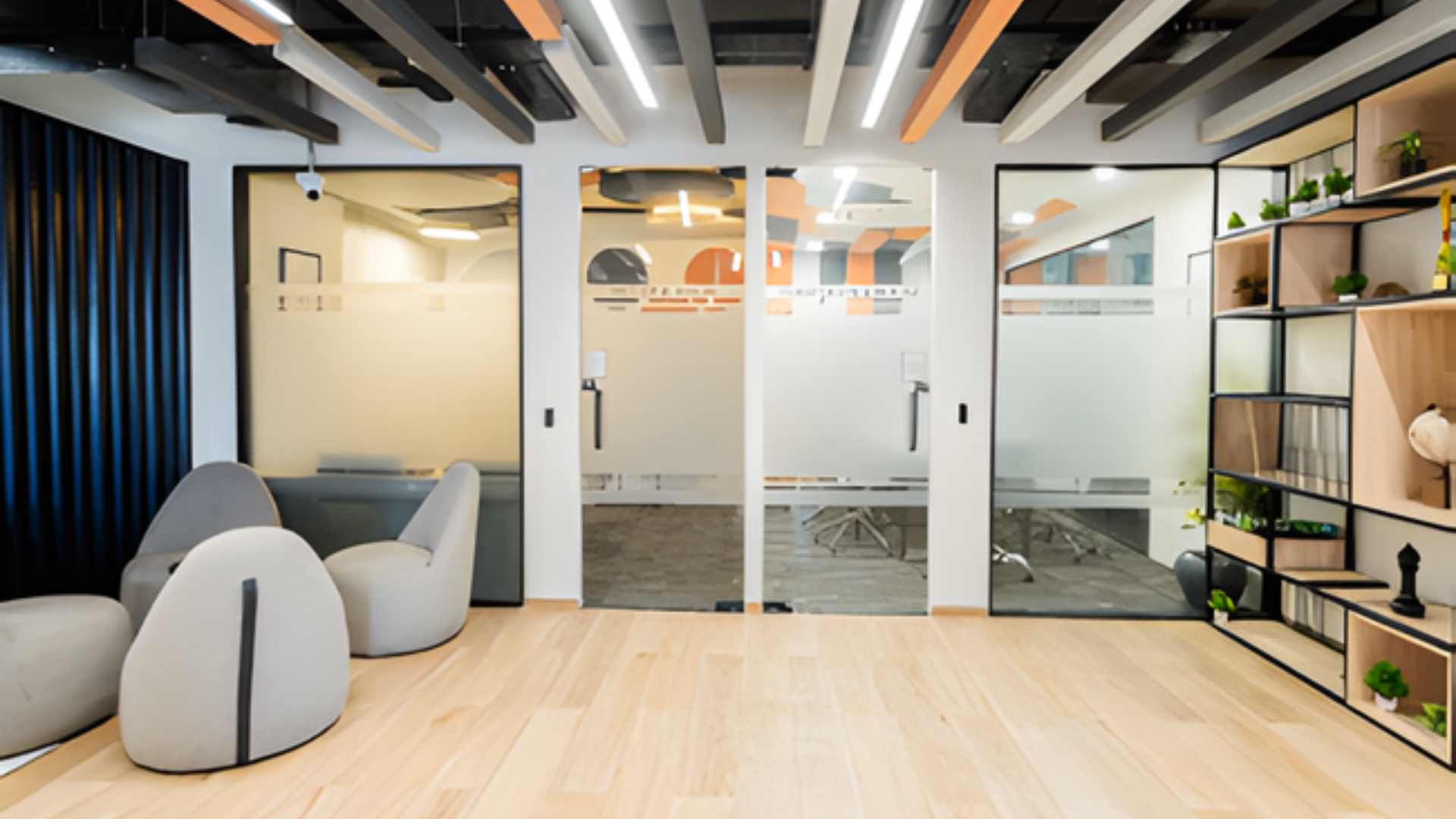Workplaces today are not just about deadlines and meetings; they also need to be spaces where people feel comfortable and supported. Whether you work solo or with a team, coworking spaces are changing the way we experience work, and they are doing a lot for mental health along the way.
Imagine being able to concentrate, work together, and take breaks in a positive work atmosphere! Coworking spaces create environments that encourage creativity, combat loneliness, and reduce stress in addition to providing a desk and Wi-Fi. The atmosphere and design are crucial because they combine the right components to support your well-being and enable you to perform at your best at work.
The Impact of Coworking Spaces on Mental Health
June 23, 2025 | Workspace

The Rise of Mental Health Challenges in Traditional Workspaces.
Traditional office spaces have long been associated with stress, isolation, and burnout. Envision spending eight hours at a desk, surrounded by demanding assignments and deadlines, but feeling isolated from your peers. What was the outcome? Mental health issues such as sadness and anxiety are frequently ignored. Employees may experience fatigue and overwhelm as a result of long hours, limited social connection, and a lack of support. Studies show that employees in isolated work environments are more likely to experience mental health issues.
This makes sense when you consider that many of us are in offices where the only communication we have is with email or Slack. But what if there is another way to work—a way that brings people together, offers more flexibility, and, most importantly, puts your mental health at the forefront? That is where coworking spaces step in.
Now, let us talk about how these innovative spaces are tackling the very problems that traditional offices often ignore.
This makes sense when you consider that many of us are in offices where the only communication we have is with email or Slack. But what if there is another way to work—a way that brings people together, offers more flexibility, and, most importantly, puts your mental health at the forefront? That is where coworking spaces step in.
Now, let us talk about how these innovative spaces are tackling the very problems that traditional offices often ignore.
How Coworking Spaces Combat Isolation and Burnout
The sense of community that coworking spaces foster is among their most important advantages. The days of feeling as though you are operating in a vacuum are over. You join a vibrant community of professionals who have similar objectives and backgrounds at a coworking space. Whether it is chatting with someone over lunch, collaborating in a meeting room, or simply knowing that there’s a supportive network around you, the sense of belonging here is real.
This community feeling does wonders for mental health. It reduces feelings of loneliness and isolation that are all too common in traditional office settings. Plus, the environment is designed for flexibility, which is key to reducing stress. Having the option to move around and choose where you work—whether that is in a cozy corner or a collaborative meeting room can make a huge difference in how you feel throughout the day. And let us not forget that in many coworking spaces, there are fun activities and networking events to help you connect with others. These spaces understand that your well-being is not just about where you work but who you work with.
But it is not just the people around you that matter. The environment itself plays a significant role, too.
This community feeling does wonders for mental health. It reduces feelings of loneliness and isolation that are all too common in traditional office settings. Plus, the environment is designed for flexibility, which is key to reducing stress. Having the option to move around and choose where you work—whether that is in a cozy corner or a collaborative meeting room can make a huge difference in how you feel throughout the day. And let us not forget that in many coworking spaces, there are fun activities and networking events to help you connect with others. These spaces understand that your well-being is not just about where you work but who you work with.
But it is not just the people around you that matter. The environment itself plays a significant role, too.
How Coworking Space Design Reduces Stress
Coworking spaces' layout has a big impact on encouraging mental health. You should feel relaxed, invigorated, and refreshed when you enter a well-designed room. All the details, including the large layouts and abundance of natural light, are carefully considered to reduce stress. Unlike the claustrophobic cubicles in traditional offices, coworking spaces offer open layouts that allow for better airflow and movement, which has a significant impact on your mood and productivity.
Coworking space design is not just about aesthetics—it is about creating a space that encourages calm and focus. The right colours, materials, and layout can foster an environment where you feel at ease. For instance, soft lighting and greenery are proven to reduce anxiety and improve concentration. Ergonomic furniture ensures that your body is comfortable, which, in turn, helps relieve physical strain and stress. When you feel physically relaxed, your mind is free to focus on what truly matters: your work.
Now, it is not just the work environment that is key. The way we work together and collaborate can also contribute to mental well-being.
Coworking space design is not just about aesthetics—it is about creating a space that encourages calm and focus. The right colours, materials, and layout can foster an environment where you feel at ease. For instance, soft lighting and greenery are proven to reduce anxiety and improve concentration. Ergonomic furniture ensures that your body is comfortable, which, in turn, helps relieve physical strain and stress. When you feel physically relaxed, your mind is free to focus on what truly matters: your work.
Now, it is not just the work environment that is key. The way we work together and collaborate can also contribute to mental well-being.
The Mental Health Benefits of Networking and Collaboration in Coworking Spaces.
Another often overlooked benefit of coworking spaces is the opportunity they provide for networking and collaboration. There are new ideas, collaborations, and connections that you might not find in a standard office setting when you're surrounded by a varied collection of people. Because it promotes a sense of community and breaks up the monotony of working alone, this is particularly significant for mental health. Whether you are bouncing ideas off someone in the lounge or teaming up in a meeting room for a project, the chance to collaborate can make your work feel more rewarding and less stressful.
When you collaborate, you not only grow professionally but personally as well. Events at a lot of coworking spaces cover subjects other than work. These gatherings foster interpersonal connections and the development of community support networks. Being around by like-minded people allows you to talk about your problems, come up with solutions, and even give advice—all of which reduce stress. Your mental health can be greatly improved by having a strong network, which will provide you with the motivation and support you need to succeed at work.
But what about the workplace itself? How does a coworking space specifically cater to the well-being of employees?
When you collaborate, you not only grow professionally but personally as well. Events at a lot of coworking spaces cover subjects other than work. These gatherings foster interpersonal connections and the development of community support networks. Being around by like-minded people allows you to talk about your problems, come up with solutions, and even give advice—all of which reduce stress. Your mental health can be greatly improved by having a strong network, which will provide you with the motivation and support you need to succeed at work.
But what about the workplace itself? How does a coworking space specifically cater to the well-being of employees?
Mental Health and Employee Well-being Programs in Coworking Spaces.
These days, mental health is more than just a catchphrase. It is a crucial component of every workplace strategy. Coworking spaces have become essential as more businesses realize how important it is for employees to be happy. Numerous locations provide unique services like yoga classes, stress management lectures, and wellness workshops. Workplace pressures are intended to be balanced in a healthy way by these programs.
Supporting employee well-being is advantageous for employers. Providing access to these spaces can increase worker satisfaction, reduce burnout, and boost productivity. Businesses benefit when they put their employees' mental health first as it makes them feel valued. Coworking spaces aim to support your mental, emotional, and physical well-being in addition to providing a workspace.
Coworking spaces provide a setting that fosters mental wellness.
Supporting employee well-being is advantageous for employers. Providing access to these spaces can increase worker satisfaction, reduce burnout, and boost productivity. Businesses benefit when they put their employees' mental health first as it makes them feel valued. Coworking spaces aim to support your mental, emotional, and physical well-being in addition to providing a workspace.
Coworking spaces provide a setting that fosters mental wellness.
Summing Up!
In today’s fast-paced world, it’s more important than ever to pay attention to your mental health at work.
Coworking spaces, with their sense of community, flexibility, and well-being-promoting design aspects, provide a welcome change from the usual office arrangement. These areas are changing how we approach work by dismantling barriers of isolation and offering chances for networking, teamwork, and self-care.
It is no longer just about the job you do—it is about how you feel while doing it. If you are looking for a space that not only meets your professional needs but also supports your mental health, coworking spaces might be the solution you have been searching for.
After all, a balanced mind equals better work, better relationships, and, ultimately, a more fulfilling life.
Coworking spaces, with their sense of community, flexibility, and well-being-promoting design aspects, provide a welcome change from the usual office arrangement. These areas are changing how we approach work by dismantling barriers of isolation and offering chances for networking, teamwork, and self-care.
It is no longer just about the job you do—it is about how you feel while doing it. If you are looking for a space that not only meets your professional needs but also supports your mental health, coworking spaces might be the solution you have been searching for.
After all, a balanced mind equals better work, better relationships, and, ultimately, a more fulfilling life.




